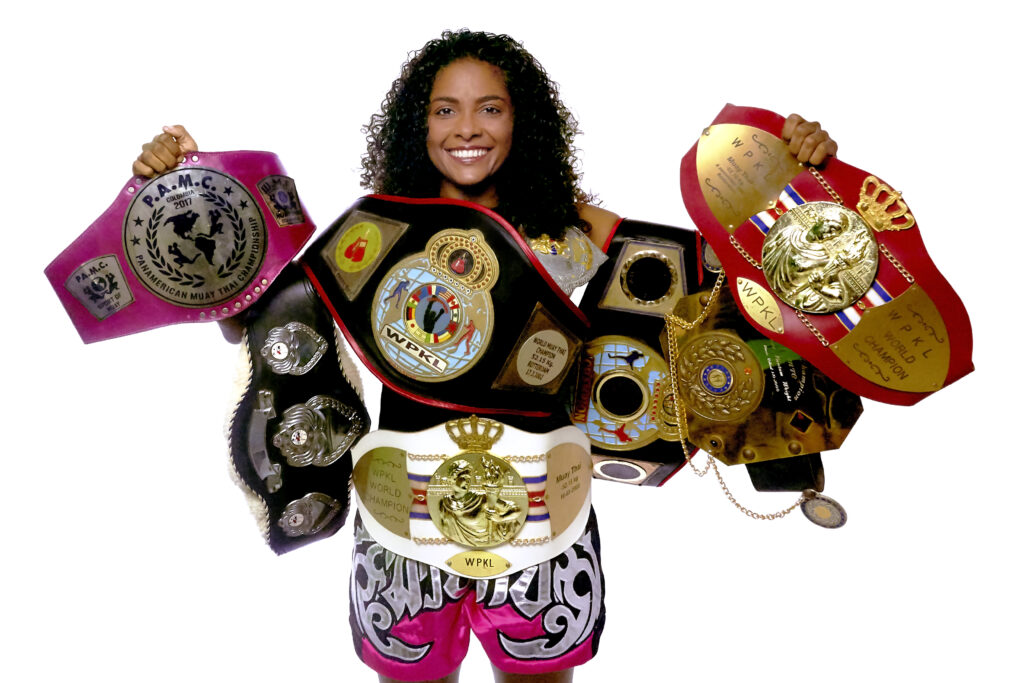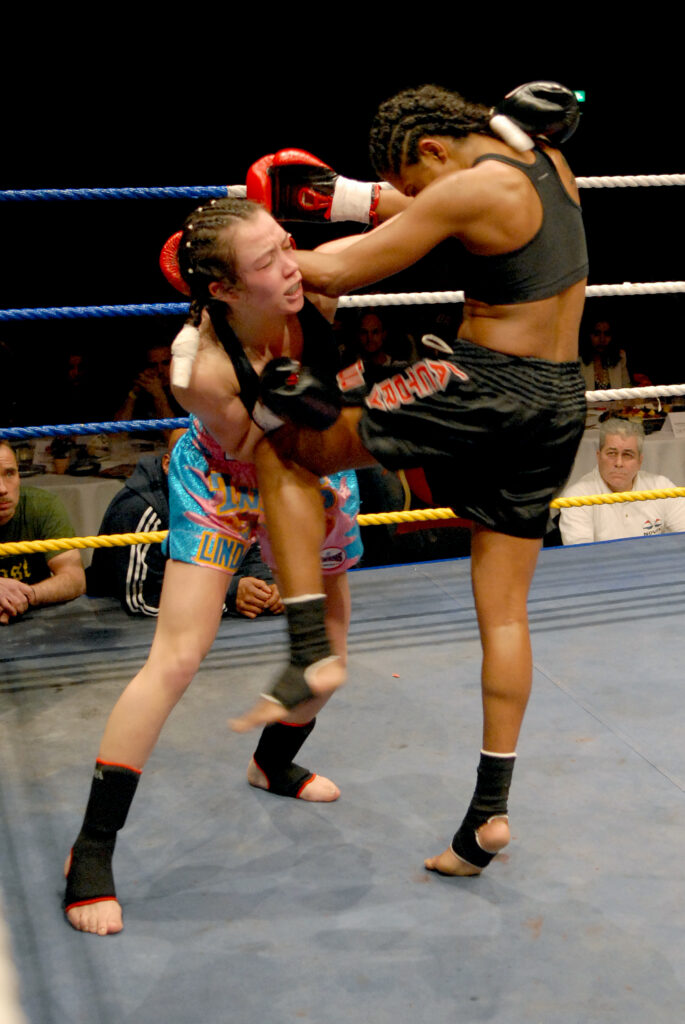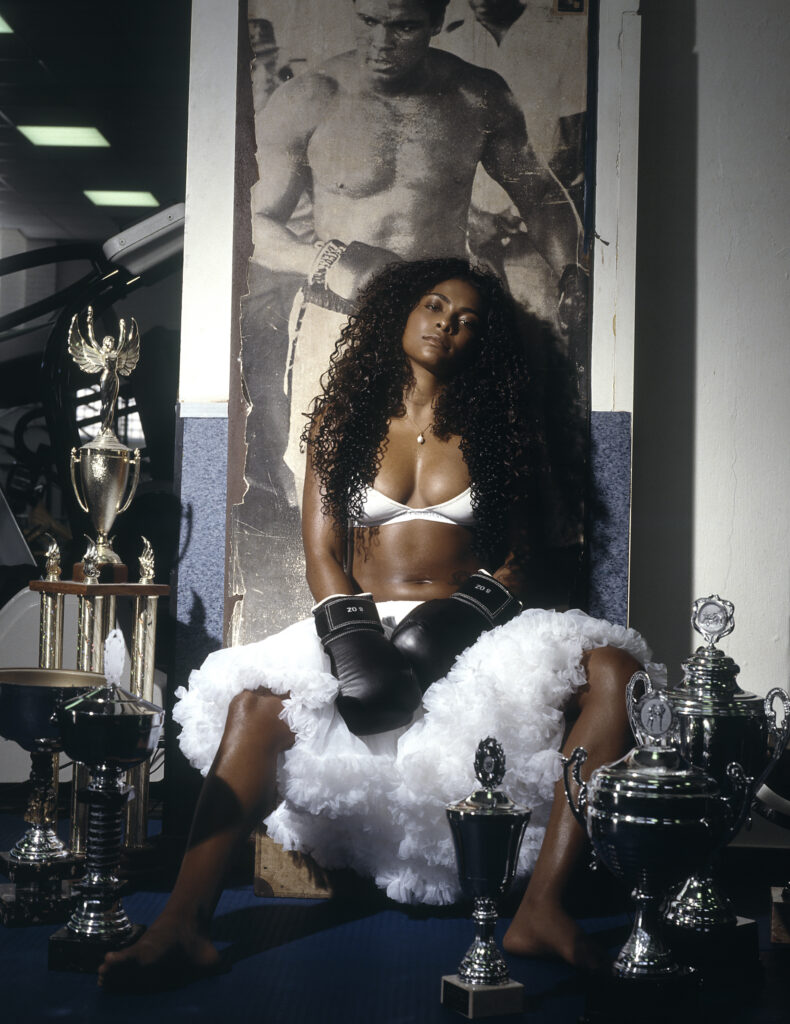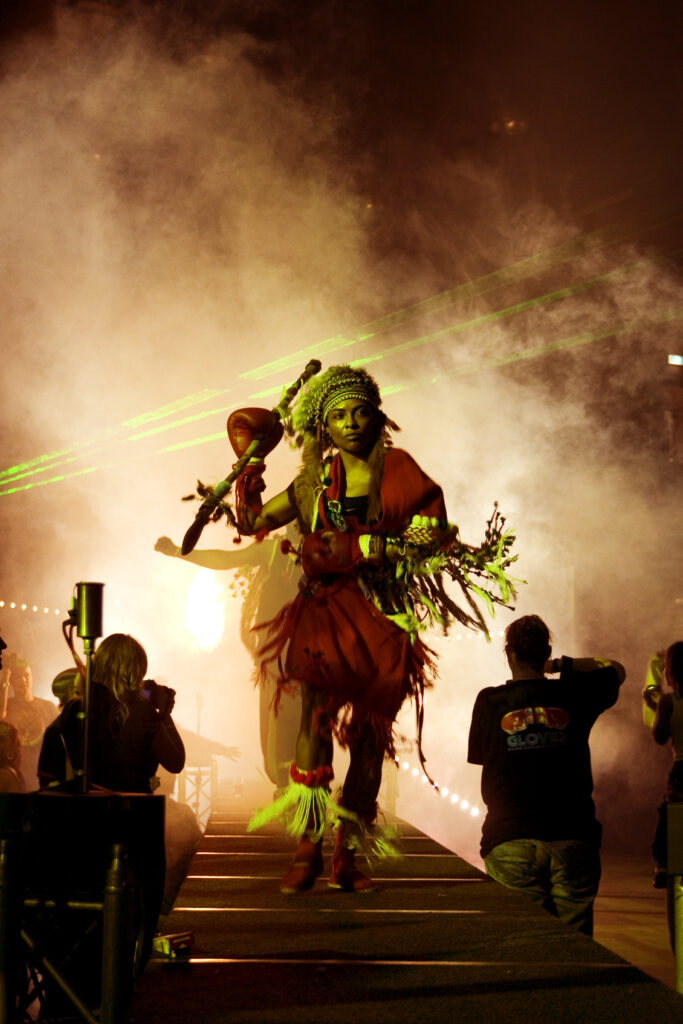Introduction
Ilonka Elmont is a retired professional Muay Thai fighter, who is seven times World Champion, a European Champion and a two times Dutch Champion in the Flyweight division. She was born and raised in Suriname, then moved to Netherlands with her family at the age of 8. She is an unorthodox striker, who has developer her own signature techniques, such as one she calls a “tic-tac” kick.
She is currently a Muay Thai trainer, and has been putting on seminars for 27 years. Elmont has also dabbled in modeling and acting.-, including starring in a critically acclaimed short film ‘Color Me Bad’. In 2007, she started the Ilonka Elmont Foundation – a charitable organization whose mission is to support children and communities in need. Ilonka Elmont is a very well-rounded individual, in addition to being a legendary martial artist.
Q & A
FightMatrix: Will you please tell us about your childhood and where you grew up?
Ilonka Elmont: I was born in Suriname, South America, but raised in Amsterdam.
My parents moved to the Netherlands to study, so during my early years I lived with my grandparents in Suriname. When I was eight years old, I joined my parents in Amsterdam.
When I think back to my childhood in Suriname, I immediately remember freedom, nature, warmth, and family. Moving to Amsterdam was a big change, but also a great experience. Growing up in a city like Amsterdam makes you mature faster, you must be a go-getter and a dream chaser if you want to succeed in sports, music, or any other field. At the same time, Amsterdam offers endless opportunities to turn your dreams into reality.
I was fortunate to have many friends, and it’s special to see that several of my childhood friends went on to become stars in music, soccer, and kickboxing/MMA. Looking back, I realize that both Suriname and Amsterdam shaped me; Suriname gave me roots, Amsterdam gave me wings.
FM: How did you become involved in Muay Thai and kickboxing?
IE: I already knew Lucien Carbin, my later trainer, from my neighborhood, though at that time I didn’t realize he was such a legendary coach in Muay Thai and kickboxing.
A few years later, while living on my own with my dog, I became friends with my neighbor, Jerry Morris, a multiple-time world champion in kickboxing. He kept insisting that I try training because he believed I had the right temperament to be a fighter. One Tuesday, I finally joined him for a class, and there was Lucien Carbin, teaching.
During the training, Lucien asked me if I had ever fought before. I laughed and said, “Well, yes, everyone in Amsterdam has been in a street fight.” I thought that counted! He looked at me and said that he could make me a champion within a year, because I had exactly the temperament Jerry had noticed.
From the very next morning, I committed fully. I started training with Lucien two to three times a day. Within nine months I became Dutch Champion, two months later European Champion, and four months after that World Champion in Muay Thai under the WMTC. That was the moment I knew I had found my true calling.
FM: As a multi-time World, Dutch, and European Champion in Thai Boxing, what inspired you to compete in Muay Thai and Kickboxing? How did you feel when you first won a championship?
IE: I’ve always been drawn to challenges and passionate about martial arts, even though my parents didn’t initially allow it. My role models, including Lucien Carbin, Ramon Dekkers, and Thai legends like Samart Payakaroon, inspired me to keep pushing forward. My first World Title fight was against a Thai champion. I was nervous, but as the fight progressed, I realized I was faster, stronger, and sharper. When my hand was raised, I knew all the sacrifices were worth it. It wasn’t just a victory in the ring, it was proof that discipline and belief can turn dreams into reality.
FM: You’ve taught Muay Thai and kickboxing seminars for 27 years. How much longer do you plan to continue?
IE: As long as my passion remains, and I don’t see it fading anytime soon. Teaching still gives me immense joy. Over the years, I’ve developed my own style: unorthodox striking that blends speed, precision, and unpredictability, allowing me to adapt to any opponent or situation.
For me, teaching is not only about techniques, it’s about mindset, resilience, adaptability, and believing in your own power. Coaching my son, who is also a fighter, adds an extra layer of inspiration and challenge. Balancing the roles of mother and coach can be tough, but it’s also deeply rewarding.
FM: As CEO of the Ilonka Elmont Foundation, what motivated you to start it? What is its mission? Have you observed any impact from the foundation, and if so, what kind?
IE: During my fighting career, I realized that sport has the power to transform lives far beyond the ring. While competing at the highest level, I actively engaged in social projects in Amsterdam, giving seminars to at-risk youth and juveniles in detention centers. My goal was simple but vital: as a role model, I wanted to inspire them to make different choices in life and show them that discipline, focus, and perseverance, the very skills I honed in sport, can open doors they never imagined. These efforts were recognized when I was honored as an honorary citizen of Amsterdam.
In 2007, I founded the Ilonka Elmont Foundation to give back to Suriname, my roots. We organized martial arts events to raise funds, which were then donated to support children and communities in need.
From 2008 to 2012, I served as Sport Ambassador for the Dutch government, promoting sport and leadership in their former colonies, demonstrating that structured programs in sport, culture, and education can create lasting, positive impact.
These experiences inspired me to focus on sustainable projects through the Ilonka Elmont Foundation, empowering children, especially those from disadvantaged backgrounds and children with disabilities, through sport, play, cultural engagement, and education.
Through programs like Dancing Words – Spoken Dance, Special Heroes, and Sports Days for Children with Disabilities, children gain confidence, develop leadership and social skills, and discover the joy of self-expression and community. Every time I see a child gain confidence or smile because of sport, play or culture, I know this work matters as much as any championship belt I ever won.
FM: How does Muay Thai differ from kickboxing? Which do you prefer?
IE: They’re quite different. Kickboxing is more Western, it’s basically boxing with kicks, influenced by styles like karate or taekwondo, and the rules are more restricted. Muay Thai comes from Asia and uses more “weapons”: elbows, knees, clinching, and sweeps. It’s kickboxing on another level. Personally, I definitely prefer Muay Thai.
FM: In a street fight, which is considered more effective to use—Muay Thai or kickboxing? Please explain the reasons for your answer.
IE: Muay Thai without a question. It gives you more “weapons” than kickboxing. In a close-range brawl you can clinch, throw knees, control your opponent, and even use sweeps if necessary. If the fight happens at a distance, you can always rely on your kickboxing or boxing techniques.
FM: What was the most memorable rivalry of your career and why?
IE: The rivalry with Mary Hart stands out the most. We fought twice, and I won both matches. The first fight was unusual, I was actually a spectator at the event when her opponent withdrew at the last minute. The promoter asked if I wanted to step in and my coach and I agreed. Mary had just come from a training camp in Thailand, and I was always prepared to step in as a replacement fighter. In that fight, we barely had time to warm up, but during the fight I managed to land my signature move, a fake right low kick followed by a jumping high kick, which I call a “tic-tac.” You can actually see it in my highlights.
Later, Mary challenged me again, this time for a world title. Facing her and many top fighters from the UK added a fierce national rivalry element between the UK and the Netherlands. That rivalry reminded me that preparation and creativity are always my strongest weapons.
FM: Who do you consider to be the greatest combat sports artist of all time?
IE: There are many legends—Muhammad Ali, Sugar Ray Robinson, Ramon Dekkers, to name a few. But if I had to choose one, I’d say Muhammad Ali. He wasn’t only a fighter in the ring; he fought for something far bigger outside of it. That’s the mark of true greatness.
FM: Is there any additional information you would like to share with your fans and our audience?
IE: Absolutely. I want to thank every fan for believing in me and supporting me throughout my journey, it truly means the world. I’m grateful to God for every step of the way. Remember: success is never just about talent, it’s about discipline, focus, and the courage to keep going when it gets tough. If you carry that mindset, you can achieve anything.
For anyone interested in unorthodox striking, I offer personal training and seminars worldwide, and I’d be thrilled to share my knowledge, just reach out.
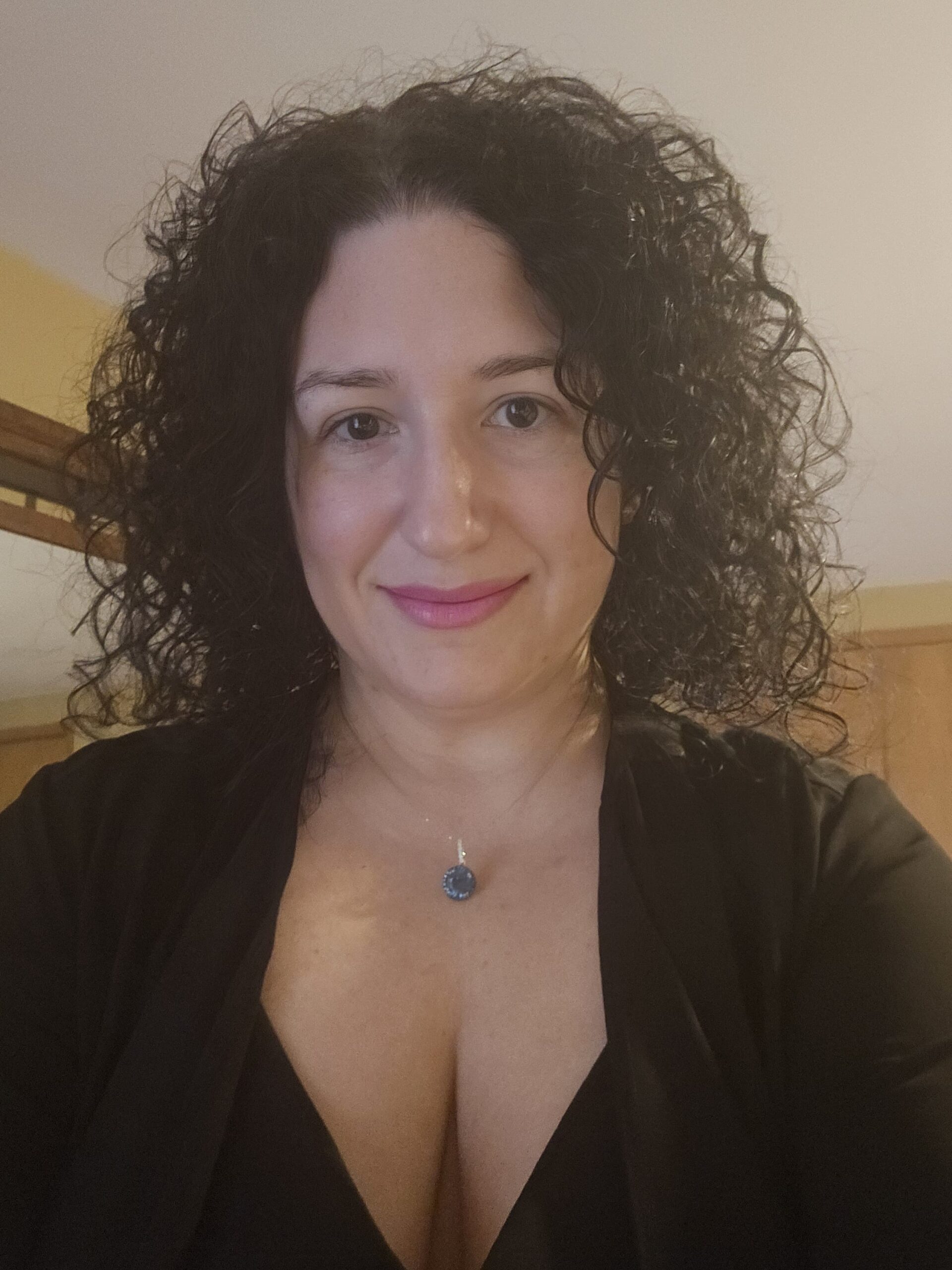
MMA & Boxing Writer | Business Development Consultant
I have been an avid viewer of Boxing and MMA for decades. Judo is the martial art that I most admire. As a teenager I practiced for a bit. This piqued my interest in MMA since 2001. Now I am on a new journey, hitting the dojo when possible. Learning how to methodically adapt to Judo, currently is a hobby that I enjoy. At FightMatrix, I am the business development consultant. Additionally, I write about various martial arts and boxing.



